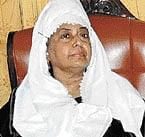
The image that comes to mind is of the poet walking the sands as giant waves roll up to maul the beach. It’s an image from the late seventies when, working in Bombay, I kept planning to attend at least one of her weekend soirees. Here she interacted with young writers and admirers, with laughter and poetry in the air. I never went, but later met her in Madras when my mother and she were on the Filmfare jury. When my niece married her eldest son, we were related.
And the image? It probably springs from some long-remembered poem of hers.
Kamala Das’ restless spirit made her move from Hinduism to Islam, from Kerala to Pune, from one claustrophobic, tradition-bound space to another, always searching. She experimented with verse and fiction, drama and painting, probing and mining an ideal world that always seemed to elude her.
Madhavikutty in Malayalam and Kamala Das in English, she hacked away at the fetters of convention, wooing a freedom that let her speak her mind and bare her soul. She scandalised an entire readership with her candour, her explorations in the hitherto nether world of female sexuality. “If love is a flower, lust is its fragrance,” she said, harking back to Jayadeva’s depiction of Radha and Krishna’s love. She wrote that a woman should stand naked before a mirror with her lover, letting him see her exactly as she is. Her awareness of an awed, disapproving world made her words even more striking. “Through peep-holes, the neighbours watch/ they watch me come/ And go like rain.”
And a growing fellowship of young minds read and resonated, seeking and addressing their own sexuality and concerns of freedom through her words.
Late in life, however, she rebelled against that very freedom. She sought the “protection” of puritanism, getting those former fetters firmly back in place. She admitted to having been rebellious and living dangerously when she was younger, but “now I have changed.” It was, perhaps, to be expected. Her changeability, her constant ability to startle. Her freedom to evolve, to seek new modes of life and expression.
Kamala Das was outspoken. She made sure she was always heard. Her readers, her admirers and detractors obliged by reacting to her moods, her whims, her sudden startling decisions. She was in the news, whether for being in line for a Nobel nomination or her change of religion or for the spirit with which she dismissed fundamentalists who swore they’d stop her receiving a State award.
She was 75 when she died last Sunday and the world came to weep at her feet.
Kamala Das was born in Punnayurkulam in Thrissur District, the daughter of V M Nair and Nalapat Balamani Amma, the renowned Malayalam poet. Her great uncle, writer Nalapat Narayana Menon, and her mother were inspirations within the family. But a woman poet must break out to reach her truth to her readers. Kamala Das was already married at 15 to a man 15 years her senior. He was a father figure. She acknowledged on many occasions that he was an understanding man, encouraging her to seek friends closer to her age.
But a woman poet must break out. Kamala Das dedicated her day to the duties of wife and mother. When the household went to sleep, the kitchen table became her writing desk and the night’s silence succumbed to the soft clatter of her typewriter.
In the 60s, her book Summer In Calcutta emerged as a revelation. Stepping away from the dainty writing of the time and into the uncertainty of a virtual precipice, she impressed a fresh new readership. At 42, faced with thoughts of impending death, she sought to “empty herself of all her secrets” and wrote her controversial autobiography, My Story. I remember many a discussion, also with some writers, who chuckled away those secrets, saying “it’s all fiction!” But it was a strong voice, a real voice, an utterance that broke through years of subjugation. That she voiced her sexuality was symbolic in a land where, ignoring its own history of openness, people had spread a cloak of austerity over the daily rituals of normal life.
When the soul ignites, words are often a balm. And from those words rise others with other words. Kamala Das inspired a young nation of poets. Her fiction too threw up several stark, aching moments. I was struck by her short story, Doll for the Child Prostitute. She could articulate the deepest cry with the voice of honesty. I read and re-read her abject calls to Krishna, dark lover, mystic messiah, the only hope in a land of the suffocated.
I read her short story about the writer who goes in search of a mercenary killer. When she finally meets him, we realise she’s the intended victim — she wants to pay a hired killer to take her life!
Now that other image returns, the thundering waves and the lone figure on the sands, haunting those who can still see.